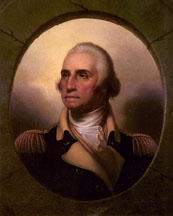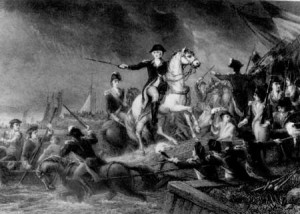On this date in 1776, the American Revolution almost came to a devastating end just a little more than one month after the fledgling nation declared its independence.
 George Washington was given the task by the Continental Congress to protect New York City from the British military. It was a virtually impossible demand. Washington had no navy; the British had the greatest one in the world. Washington’s army was an army in name only, without regular training and relying on short enlistments from militia; the British troops were disciplined and focused.
George Washington was given the task by the Continental Congress to protect New York City from the British military. It was a virtually impossible demand. Washington had no navy; the British had the greatest one in the world. Washington’s army was an army in name only, without regular training and relying on short enlistments from militia; the British troops were disciplined and focused.
Further, Washington had no firm idea where the British would land. Would it be directly on Manhattan or on Long Island, across from the city itself? So he divided his army between the two, which was not a wise military decision.
The American army was overwhelmed on Long Island, pushed back to the very brink of the river. As night fell, everyone knew that morning would bring the assault they had little hope of halting.
So Washington made a bold gamble.
He decided to try to evacuate his entire army to Manhattan overnight. The attempt was almost as impossible as defending New York. Wouldn’t the British hear what was happening? Couldn’t their navy come up the river and block the evacuation route? How could he ever pull this off?
 First, the wind blew in the right direction, keeping the large British ships from coming up the river. It didn’t stop the small boats Washington was using, however.
First, the wind blew in the right direction, keeping the large British ships from coming up the river. It didn’t stop the small boats Washington was using, however.
Second, that wind and the rain had created a cover for the noise made by the evacuation. Yet, before the night was over, the storm stopped, and they had to be much quieter. Somehow, the British didn’t hear them.
Third, Washington had kept a line of Pennsylvania troops in the front, making it appear there was no evacuation taking place. That fooled the British. Yet when the Pennsylvania troops mistakenly left their post, thinking it was their turn to get in the boats, no one on the British side noticed. Washington himself discovered the mistake and sent them back.
Fourth, as dawn came, Washington knew he needed a few more hours to get everyone off Long Island. But the morning’s light was going to reveal what was taking place. Right at that moment, a dense fog settled over the encampments and stayed long enough for Washington, in the last boat, to leave. When the British could finally see, they were stunned by what had transpired. The enemy was gone.
Even historian David McCullough, in his classic book 1776, attributes this unlikely escape to the hand of Providence. Yes, overall, this battle, and the ones that followed immediately after, were military disasters for the Americans. But at least an American army still existed.
The rest is, as they say, history.
